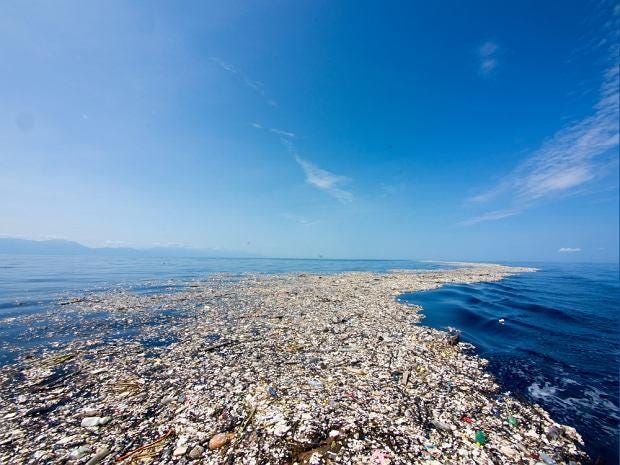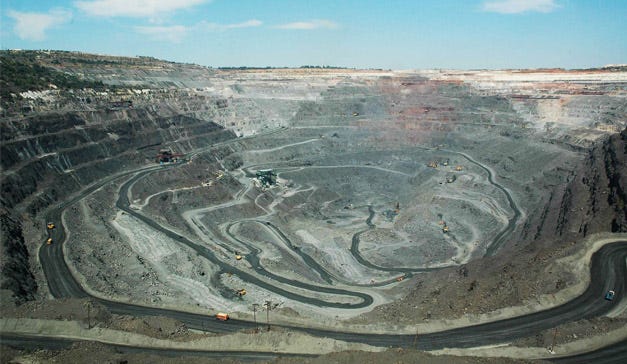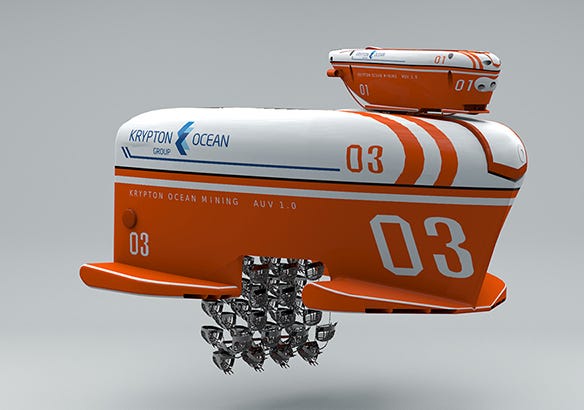
When NASA together with SpaceX launched a special satellite to find planets with aliens, one strange idea came to my mind in addition to pride in space exploration: what would we tell aliens about our world in case of a possible contact?
Just assume there won’t be a chance to hide anything from the super intelligent extraterrestrials and the humans will have to reveal everything actually happening on Earth today. Even if we leave aside the present socio-political shortcomings such as populist presidents, dictators, hybrid wars, 900 million starving people while 2 billions suffer from obesity etc, what could we proudly explain them about our techno-economic progress?
The Great Pacific Plastic Patch, oil-dependent economy, carbon emissions due to still dominating fossil fuels, open-pit mining, insufficient development of electric vehicles due to a battery shortage caused by a seemingly existing cobalt deficiency, and almost total disregard for the enormous renewable treasures our oceans offer us — overconsumption, environmental disasters, and an extremely inefficient resource management.
Jesus, how shameful!
It seems we are still too immature to get in touch with extraterrestrial intelligence.
Nevertheless, it’s never too early to figure out why it so happens what happens.
First of all, we should realize that the contemporary economy is too complex to let something happen on its own. Once the Great Plastic Patch appeared, for example, there should be a deep reason for it. Even a chain of cause and effect is available there staying probably not so apparent when the phenomenon is addressed quite superficially. To think that thousands and thousands of tons of plastic garbage have been gathering into a huge island in the Pacific ocean in a “random natural manner” is a childish vision.

Let’s try to address the issue from another angle: who benefits from doing nothing with the single-use plastic garbage? Common logic suggests the organizations who are engaged in the waste treatment and recycling activities along with the national and international entities who have to pay for that treatment. Here we can see the purely capitalistic approach when extra expenses are avoided — throwing the garbage into the ocean is much cheaper than recycling it with the expensive waste treatment facilities.
The ocean is large but its capabilities to absorb pollution are not unlimited — sooner or later people will have to face the consequences. So why not use the biodegradable plastic which, moreover, was invented long ago? Because of the same reason — the ordinary plastic is significantly cheaper than the biodegradable one. “It’s the economy, stupid!”, as one of the US presidents used to say.
Now we are approaching the roots. The present civilization has a lot of things that are prohibited at the legislative level being at the same time very lucrative at the level of commerce. The lists of the prohibited things vary from nation to nation — cocaine, prostitution, gambling, poaching, chemical weapon etc. In addition, even much bigger lists of highly regulated products and activities are available — commercial logging, pharmacy, arms production and sales, exploitation of mineral resources…
It turns out that not everything depends on the economy and a lot falls within the scope of the national and international interests contradicting the purely commercial benefits. Hence, the lack of the political will and international statesmanship is the deep reason why we have not yet prohibited such things as the ordinary non-biodegradable plastic and open-pit mining in island countries, for example.

However, the prohibitions as such can hardly solve all environmental problems. The UK is going to ban the production of wet towels, for example. If so, a new product niche will appear in the market. Who knows what environmental consequences the new “placeholder” of wet towels can entail? The same relates to plastic — to ban the ordinary one is only half the story. How about some governmental subsidies for the manufacturers of biodegradable plastic? And what about the global waste treatment & recycling industry after all?
The even more weird situation takes place with mineral resources nowadays. One of the most burning topics on the Internet now is the so-called “Cobalt Crunch” which affects the battery production worldwide. Cobalt is quite rare and very expensive once the land deposits of this mineral are limited. Such famous manufacturers of the electric vehicles as Tesla and Hyundai have to constrain their production capacities due to the battery shortage.
The New Cobalt Gold Rush pushes mining corporations to another predatory open-pit mining leading to the irreversible destruction of hundreds of hectares of lands. Brazil is going to sacrifice its natural environment for only 94 000 tons of cobalt.
Thus, we use cobalt to produce eco-friendly batteries while cobalt mines destroy our landscapes.
Something is wrong with our logic, right?
The global movement to renewable energy is continuously stumbling upon the obsolete approaches to such minerals as cobalt, nickel, and copper crucial for the electric battery production. We are going to refuse ICE (inner combustion engine) vehicles and fossil-fuel power plants in favor of VCs and “Gigafactories” without understanding that the renewable energy sector won’t do without renewable mineral resources on a planetary scale.
Where can we find the sufficient mineral deposits to provide the coming “battery-driven” economy with cobalt? How can we make the alternative energy facilities cheaper to provide the whole humanity with the clean energy?
Any attempt to find rich deposits of rare minerals onshore is at best a palliative aimed at just short-term tactic objectives. Moreover, it is a sign of the obsolete capitalistic greed having nothing common with the so-desired sustainable development.
The open-pit mining is true vandalism with regard to Earth because the continental mineral resources are renewable under no circumstances! Only seabed sediments containing billions of tons of minerals can satisfy our demand in the renewable resources of cobalt, nickel, copper, and manganese.
About 10 billion tons of polymetallic nodules and crusts are generated annually at the ocean bottom. Annually means the process runs all the time.
We regularly trim our nails and cut hair, we milk the cows, we mow loans. Why? Because we need to remove the excess to prevent oversupply. Seabed minerals need the same.
How odd it may sound, but the commercial seabed mining can facilitate the oceans in their regenerative activity! We will never extract more minerals than the Earth’s oceans can generate.

The strange thing is that the publicly accessible information about the huge mineral deposits available at the ocean bottom does not apparently resonate with the investment objectives of numerous hedge funds and billionaires who are constantly looking for the new investment opportunities. It seems they cannot recognize a clear link between quite insignificant expenses necessary to start mining seabed minerals and the untold wealth which could be brought by the new oceanic extractive industry.
However, times are changing, and the present Cobalt Rush can trigger a seabed mining race because what is happening today is nothing but a true paradigm shift in the global economy. And the one who is able to recognize the promise will monopolize the market.
The first hint at a possible winner of the coming seabed mining race is available, by the way. The world’s second-largest economy which is going to lead the world in the nearest perspective reserved 86 000 square kilometers of the ocean floor for further mineral exploitation, as the Chinese Ministry of Land and Resources said. Hence, China has become the country with the most categories of seabed mineral in the world.
What would we call that if not the far-sighted economic strategy? The strategy based on a profound understanding that just cobalt and nickel will replace oil and gas in the new fossil-fuel-free world order. Neither political populism nor nuclear weapons can determine who will be number one in the post-oil era when the inevitable total digitization of the entire lifestyle of the humanity depends on the battery-driven commodities beginning from smartphones and up to power plants.
As the Bible says, “Whoever has will be given more, and he will have an abundance” (Matthew 13:12). Even though China, in general, is far from Christianity the very modus operandi of the Chinese leadership with regard to seabed mining corresponds well to the above quote. Perhaps we’ll know soon enough who has the power to dictate terms in the world mineral market…
The environmental activists who, by the way, did not observe the Plastic Patch when it was the size of France (now it is tripled) can build buzz for seabed mining to address the protection of oceans and seas. Game face, but it’s all about the mining technologies that are hardly well-known to the activists.
Indeed, it is impossible to extract minerals from the ground without making holes in the Earth, the giant holes visible even from space. But the seabed minerals in the form of polymetallic nodules are dispersed over the vast fields of the oceanic bottom. And it is not necessary to mine them with the same technology used by the ordinary continental miners!
Thus, the submersible autonomous vehicles can “levitate” over seabed floor due to their positive buoyancy while nodules are collected as carefully as we pick up mushrooms in a forest. No pollution, no destruction, no effect for the ocean biodiversity.

I remember a speech of a Minister of National Resources from one of the Middle East countries who was explaining students in the middle of the 2000s what an unenviable situation their country could appear in with its abundant oil stocks when the next paradigm shift happens in the economy.
The stone age, he said, was over not due to the lack of stones but because the humanity made a technological leap to metals. And the present oil-driven economy is to over not due to the depletion of the oil reserves but because the next technological leap will make fossil fuels too obsolete to hold any value.
It seems the words of that Minister are coming true. Just the renewable energy starts dominating in the broad public discourse. And the day will soon come when renewable seabed minerals will provide the material basis for the new fossil-fuel-free economy.
Recycling & Renewables: What We All Are Overlooking In The Issue was originally published in Extractive Industry 2.0 on Medium, where people are continuing the conversation by highlighting and responding to this story.